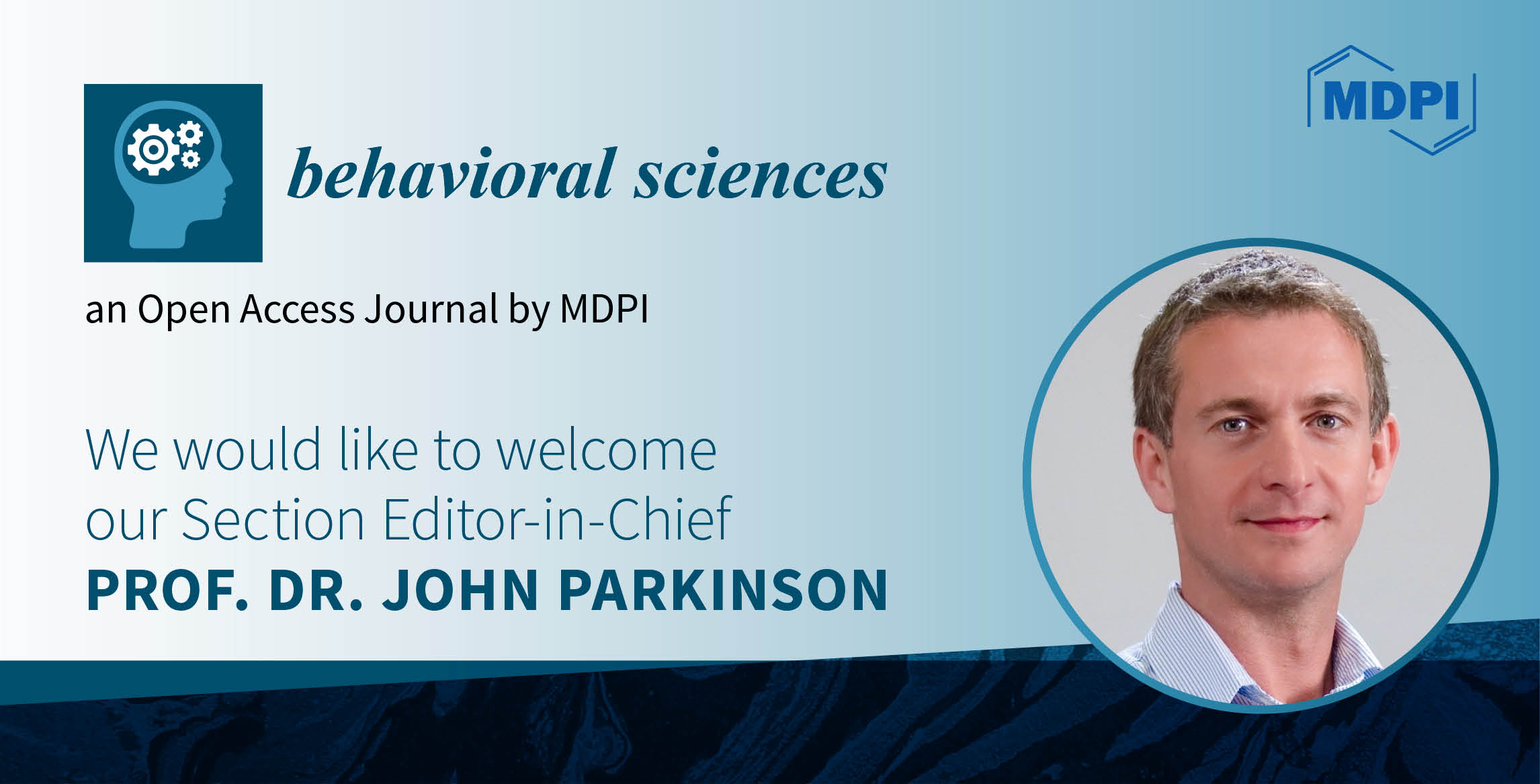
Journal Menu
► ▼ Journal Menu-
- Behavioral Sciences Home
- Aims & Scope
- Editorial Board
- Reviewer Board
- Topical Advisory Panel
- Instructions for Authors
- Special Issues
- Topics
- Sections
- Article Processing Charge
- Indexing & Archiving
- Editor’s Choice Articles
- Most Cited & Viewed
- Journal Statistics
- Journal History
- Journal Awards
- Editorial Office
Journal Browser
► ▼ Journal BrowserNeed Help?
Announcements
2 April 2024
Prof. Dr. John Parkinson Appointed Section Editor-in-Chief of Section “Cognition” in Behavioral Sciences

We are pleased to announce that Prof. Dr. John Parkinson has been appointed Editor-in-Chief of the Section “Cognition” of Behavioral Sciences (ISSN: 2076-328X).
Prof. Dr. John Parkinson is a professor of behavioral psychology at Bangor University, UK. He has held various editorial roles on the boards of scientific journals and has worked with journals as a reviewer throughout his career. Prof. Dr. Parkinson has extensive leadership and management experience including being Head of the School of Psychology, Bangor University (2013-2020), and then Dean of Faculty, Bangor University (2020-2023). He is the author or co-author of more than 70 published peer-reviewed papers and has advised businesses, the public sector, and the government on behavioral science policy.
His research interests encompass the interaction between cognition and motivation, with a particular focus on behavior and behavior change. This includes the following:
- Dual-process approaches to behavior;
- The real-world application of health promotion and illness prevention;
- The influence of motivational states on cognitive processes such as attention, memory, and decision-making;
- Design thinking and innovative approaches to research design and implementation.
The following is a short Q&A with Prof. Dr. John Parkinson, who shared his vision for the journal with us, as well as his views of the research area and open access publishing:
1. What appealed to you about the journal that made you want to take the role as its Section Editor-in-Chief?
Behavioral Sciences is perfectly positioned to represent the research I conduct. It is an international, peer-reviewed, open access journal embracing the domains of psychology, neuroscience, and cognitive science. As such, it provides an excellent forum for publishing and reading articles of relevance to my work.
My experience of publishing in Behavioral Sciences has been a very positive one: editorial staff are supportive and constructive, the process is clear and straightforward, and the time between submission and publication is kept to a minimum through effective and efficient processes and peer-review. Overall, the journal strives for integrity and quality.
More broadly, Behavioral Sciences has enormous potential to become a leading journal in the field and is developing its impact and reputation year-on-year. I would like to support and contribute to this growth and success.
2. What is your vision for the Section “Cognition”?
As Section Editor-in-Chief, I would harness the recognized value of cognition and its role in determining behavior, in order to raise the profile of the Section both within the journal and across the academic community. My aspiration is for the “Cognition” Section in Behavioral Sciences to become a core outlet for high-quality cognition research focusing on fundamental theoretical questions (about perception, memory, attention, and the like) as well as real-world applications and behavior change. For example, the experience of COVID-19 has shown the gaps in our understanding of human behavior and what mechanisms influence it, both at an individual and group level. We need to better understand how to communicate, convince, and influence behavior in our citizens and populations in order to promote healthy and safe behaviors across our societies. Cognition plays a fundamental role in this and so a focus must be on a concerted effort to bridge the gap between theoretical work including controlled laboratory studies and real-world applications. This shift will enhance the practical relevance of cognitive and behavioral science findings and facilitate the translation of research into tangible benefits for society.
3. What does the future of this field of research look like?
Cognitive science has long been at the forefront of understanding the intricacies of the human mind. The future probably revolves around several key elements including (1) technological advancement (including AI and machine learning); (2) a better appreciation of individual differences; (3) the significance of real-world behavioral applications; and (4) an overarching and holistic view on enhancing ‘healthspan’ and quality of life, helping to promote optimal human behaviors across the lifespan. Furthermore, it is likely that academics from different disciplines will more often work together to solve complex challenges. Multidisciplinary research not only enriches our theoretical frameworks but also opens new avenues for practical applications in areas like human–computer interaction and cognitive–behavioral enhancement. Finally, researchers must strive to create ecologically valid experimental designs that capture the complexity of cognitive processes in naturalistic settings. Investigating the variability in cognitive processes across diverse populations and considering factors such as age, culture, and individual experiences will lead to more nuanced and generalizable theories. This emphasis on inclusivity will contribute to the development of personalized interventions and therapies tailored to the specific needs of individuals.
4. What do you think of the development of open access in the publishing field?
The vast majority of internationally published research is for the ‘public good’ and should be accessible to everyone everywhere. As such, the core value of scientific publishing has to be reflected fully in open access policies. Open access publishing revolutionizes scholarly communication by democratizing access to knowledge. It fosters inclusivity, enabling researchers worldwide, regardless of institutional affiliation or financial resources, to freely access and disseminate cutting-edge research. Open access accelerates the pace of discovery and innovation. Moreover, it enhances the visibility and impact of research by reaching a broader audience beyond traditional academic circles.
We wish Prof. Dr. John Parkinson every success in his position as Section Editor-in-Chief, and we look forward to his future contributions to the journal.




